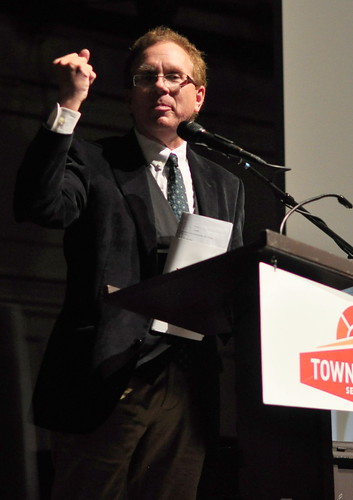Progressive journalist and prolific author John Nichols, national affairs correspondent for The Nation, addressed the 144th townhall of the Progressive Democrats of America (PDA) Sunday, on the ups and downs of the "red ripple" that, he said, salvaged the status quo for America, preserving social security, Medicare, Medicaid, and environmental concerns.
A week before, he was just wondering how many positions the Democrats would lose. "This election is why I love politics," Nichols said, calling the results "rare and wonderful," the best midterm outcome since FDR's in 1934, though multiple parties were running then in the midst of the Great Depression.
With the Senate majority won Saturday night in Nevada, Democrats can approve judges, cabinet members, and ambassadors and even negotiate with the fractious Republicans who will probably control the House. Speaker McCarthy will be boxed in by the Freedom Caucus but more moderate Republicans may be reachable for bipartisan measures.
Democrats swept secretary of state offices, so crucial because most of them are in charge of elections. Two governorships were added and three or four state legislatures turned blue and none flipped to the GOP that hadn't been there before.
Issues of inequality, the climate crisis, and the Pentagon's voracious hold on the budget won't change, said Nichols. Why not more progress? He blamed structural failure among Democratic elites, who overspend on TV advertising while devaluing vital grassroots support that could have won Mandela Barnes of Wisconsin a Senate seat, for example. The racist, xenophobic campaign waged against him outspent Democrats by $10 million. The difference in vote totals between winner and loser was 26,000 out of more than two million. A similar outcome kept Cheri Beasley from winning in North Carolina.
Republican ingenuity publicized fake or marginalized polling results to influence Democrats' allocations also. Democrats needed to concentrate on rural and small-town locations, where many more votes could have been won and with them a majority in the House. "The Democrats have a narrow vision of their true base."
Moreover, Nichols said, the Democrats lacked a coherent message weaving together issues of concern to everyone: They ran as "not Republican," rather than on issues like inflation, entitlements, the future of democracy, and abortion. Fetterman's successful campaign was based on such issues: healthcare, the right to join unions, legalization of marijuana, criminal justice reform, women's choice, and the future of democracy. He went to rural counties and small towns.
**********************
Elections in this country are more popular worldwide than the World Cup (which begins next week). Biden will probably be energized by this historic gain and run to stay in office in 2024, though we must be vigilant in case old age wears him down, Nichols said. Bernie Sanders has said he won't run for president unless Biden steps aside.
Turning to the vital importance of the youth turnout that so steered electoral results, Nichols urged PDA to prioritize them--its "single best investment." Had those aged 45 and over prevailed, more Republicans would have won. Thirteen percent more of those aged 65 and older voted Republican rather than Democratic, as did 11 percent more of the 45-65 age group. PDA should base themselves on college and high school campuses and workplace venues where young people are likely to go if they skip college.
PDA must work harder, Nichols said, at opposing Democratic corporate power. For Election 2022 between $17 and $18 billion was spent. Campaign finance reform is imperative. The voting age should be lowered to 16. Trump, who specializes in belittling Republicans, will destroy DeSantis--don't write him off.
And there's one thing more powerful than money in politics. It's gerrymandering, which is the fight of democracy. In gerrymandered Wisconsin, Nichols's home state, if Democrats win control of the supreme court next spring they will be able to outlaw gerrymandering.
In short, PDA, focus on youth, gerrymandering, and courts. In addition to everything else.






